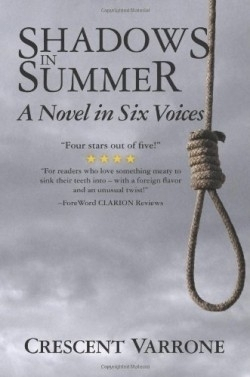Shadows in Summer
A Novel in Six Voices
Darkly flavored by family traumas and World War II Shadows in Summer is written as a response to a series of actual events in the authors life. Crescent Varrone a longtime resident of Scandinavia and the winner of a Fulbright Scholarship in 1985 explores the idea of a haunting by writing his novel from all the possible approaches to the experience—psychological metaphysical religious skeptical analytical and agnostic. Each perspective is voiced by one of the novels six main characters.
Recently returned to Copenhagen Denmark Katrina Nielsen is a former ballet dancer who can no longer perform because of a knee injury. She originally left Copenhagen at the age of nineteen after the death of her father and hopes her return will help heal the rift between herself and her mother and brother. Her husband Richard a native New Yorker agrees to the move to support Katrina but finds himself unhappy at the isolation he is experiencing at work. As each works to adjust to the move not only to Denmark but also into an old house unexplained and frightening events—odors of cigarette smoke an exploding wine glass a shove down the basement steps—threaten both Katrinas sanity and her marriage.
The use of six voices each with a different perspective allows the author to keep readers guessing as to what is really occurring within the house. The challenge however is that some of the voices are more distinct and important than others. The voice of Richards mother for example feels somewhat superfluous. Even though she expresses the religious outlook on events her chapters are the weakest in the book and could perhaps be better experienced through Richards interactions with her.
The shadows of the novel are relieved by occasional bright moments of description like Katrinas boat trip with her brother and mother:
The sunlight coming across the bow at an oblique angle glinted off the lacquered wood. I donned my Givenchy glasses tied my Herms scarf about my head and felt like Audrey Hepburn.
One of the novels greatest strengths is the clear sense of place it provides. Denmark is shown through its food its architecture and its history especially that of World War II. Edvard a survivor and psychiatrist sees Sren the neighbor as a child of the new EuropeHe never stood in line for ration cards never listened to Hitler or Goebbels on the radio.
Because of its theme and setting this novel is not a light read but for readers who love something meaty to sink their teeth into especially something with a foreign flavor and an unusual twist Varrones novel should satisfy.
Disclosure: This article is not an endorsement, but a review. The publisher of this book provided free copies of the book and paid a small fee to have their book reviewed by a professional reviewer. Foreword Reviews and Clarion Reviews make no guarantee that the publisher will receive a positive review. Foreword Magazine, Inc. is disclosing this in accordance with the Federal Trade Commission’s 16 CFR, Part 255.

